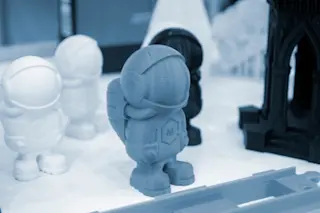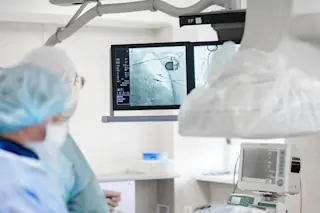The saccule and utricle, two chambers in the inner ear, detect the direction of gravity and help the body to balance. Without their influence, we quickly become lost and disoriented.
To prevent this confusion from happening to astronauts in space, scientists at Brandeis University have proposed a new system that is surprisingly simple.
It involves a series of small vibrating devices that are taped to the skin and vibrate to signal one’s position in space, a kind of mechanical inner ear. Early research has shown that the devices help but must be paired with extensive training so that users follow their input automatically.
In a series of experiments, research subjects trusted the devices and understood how they worked, but that wasn’t enough to overcome the confusion and disorientation they experienced in a simulated zero-gravity environment.
“The trust has to be at a deeper, almost sub-cognitive, level,” said Vivekanand Pandey Vimal, a researcher at Brandeis, in a statement. “To achieve this, specialized training will be required.”
How Brandeis Simulated Space Walks
The small team of researchers buckled 30 different subjects into a multi-axis rotation device (MARS), which rotated a chair on two axes to emulate a spacewalk.
At first, the team kept the machine vertical, so the subjects could rely on their inner ear to orient themselves. Wearing blindfolds and listening to white noise, the subjects rotated themselves to a predetermined “balanced” position.
Then the scientists rotated the people on their backs and instructed them to find the balanced position again, following the guidance of the vibrating devices. If the subjects rotated too far to one side, they “crashed,” and the MARS reset.
Afterward, the virtual astronauts reported that they had struggled between the misleading signals from their inner ears and the input from the devices.
Still, the latter seemed to have helped. The control group that received only MARS training had steered more erratically and crashed 2.5 times more.
Read More: How Scientists Create Oxygen for Astronauts on Prolonged Space Missions
What Are the Dangers of Long Space Missions?
Past studies have found that related devices reduce spatial disorientation in airplane and helicopter pilots, who sometimes become disoriented despite operating relatively close to Earth. Between 1993 and 2013, such interruptions led to the loss of 65 airplanes and 101 lives.
Could the same happen during the long, manned missions planned for the moon and Mars?
“Long duration spaceflight will cause many physiological and psychological stressors which will make astronauts very susceptible to spatial disorientation,” said Vimal. “When disoriented, an astronaut will no longer be able to rely on their own internal sensors which they have depended on for their whole lives.”
Read More: Why and How Do Astronauts Get Sick in Space?














